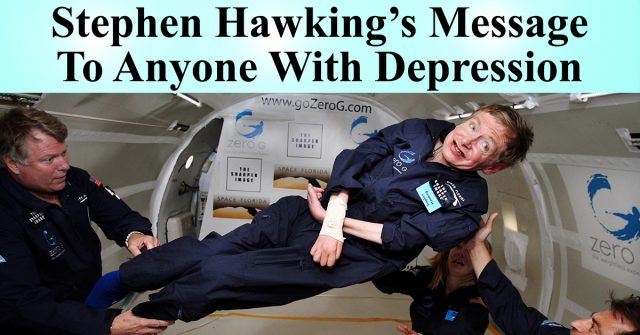Stephen Hawking was one of the greatest minds of our time. He is well known for his work in theoretical physics, and was born precisely 300 years after the death of Galileo, in January of 1942 Oxford, England. He had a passion for mathematics as a child, but after entering college he focused more on the Natural Sciences. During his first year in college at Cambridge, Hawking began to show symptoms of ALS (Lou Gehrig’s Disease) at the age of 21. He sought medical help, and the doctors advised him that he would only live for another two and a half years.
Stephen Hawking continued to teach, research, and lecture until the brilliant age of 76, not only on his field of expertise, but also on how he’s dealt with the many challenges he’s faced in life. He said that his expectations in life were reduced to zero after he received the ALS diagnosis, and that since then, every experience of his life had been a wonderful bonus that he is grateful for.
STEPHEN HAWKING’S BEAUTIFUL MESSAGE FOR ANYONE WITH DEPRESSION
Hawking’s brilliant mind did not allow his life’s challenges to stop him. He continued studying and working hard, eventually earning a total of twelve honorary degrees. He has devoted his life to seeking out answers about the universe, the Big Bang, the creation of existence and numerous scientific theories. While unable to speak or move and bound to a wheelchair, his strong will and passion have inspired the world.
“Remember to look up at the stars and not down at your feet. Never give up work. Work gives you meaning and purpose and life is empty without it. If you are lucky enough to find love, remember it is there and don’t throw it away,” Hawking explains.
At the Royal Institute in London, Hawking gave a lecture comparing black holes to depression, making it clear that neither black holes nor depression are impossible to escape from. “The message of this lecture is that black holes ain’t as black as they are painted. They are not the eternal prisons they were once thought. Things can get out of a black hole both on the outside and possibly to another universe. So if you feel you are in a black hole, don’t give up; there’s a way out,” he said.
When asked about his disabilities, he said: “However bad life may seem, there is always something you can do, and succeed at. While there’s life, there is hope.”

“If you are disabled, it is probably not your fault, but it is no good blaming the world or expecting it to take pity on you. One has to have a positive attitude and must make the best of the situation that one finds oneself in; if one is physically disabled, one cannot afford to be psychologically disabled as well. In my opinion, one should concentrate on activities in which one’s physical disability will not present a serious handicap. I am afraid that Olympic Games for the disabled do not appeal to me, but it is easy for me to say that because I never liked athletics anyway. On the other hand, science is a very good area for disabled people because it goes on mainly in the mind. Of course, most kinds of experimental work are probably ruled out for most such people, but theoretical work is almost ideal.”
“My disabilities have not been a significant handicap in my field, which is theoretical physics. Indeed, they have helped me in a way by shielding me from lecturing and administrative work that I would otherwise have been involved in. I have managed, however, only because of the large amount of help I have received from my wife, children, colleagues and students. I find that people in general are very ready to help, but you should encourage them to feel that their efforts to aid you are worthwhile by doing as well as you possibly can.”
Stephan Hawking’s beautiful message is not one that comes from speculation, but one that comes from a man who overcame all odds of being physically handicapped and still excelled by being one of the greatest minds of our time. While given every reason to fall victim to depression, his incredible will to live and to achieve, despite his hardship, is inspiring to anyone.
His daughter Lucy said, “He has a very enviable wish to keep going and the ability to summon all his reserves, all his energy, all his mental focus and press them all into that goal of keeping going. But not just to keep going for the purposes of survival, but to transcend this by producing extraordinary work writing books, giving lectures, inspiring other people with neurodegenerative and other disabilities.”
This wonderful human being and scientist will be missed.
Watch Stephen Hawking’s Lecture Below:


















